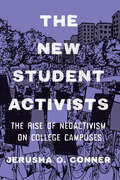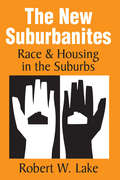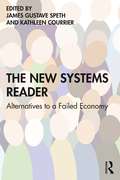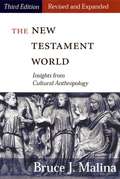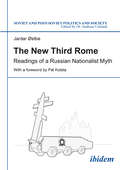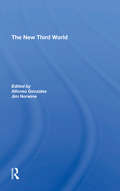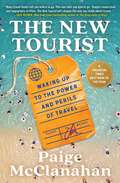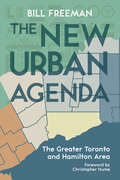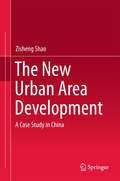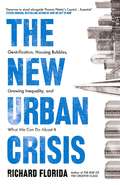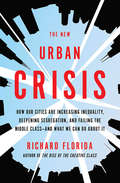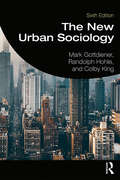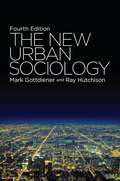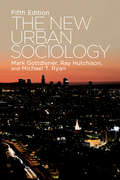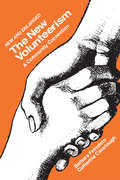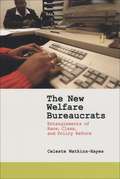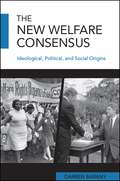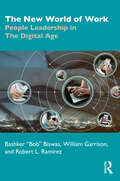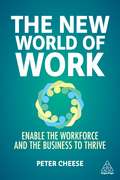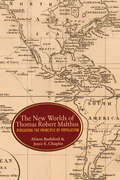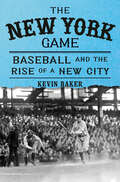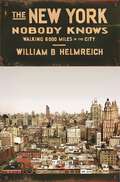- Table View
- List View
The New Student Activists: The Rise of Neoactivism on College Campuses
by Jerusha O. ConnerMeet the new breed of student activists—uncompromising, focused, and connected.Activism is once again back on college campuses as students protest issues such as sexual assault, climate change, racial injustice, and student debt. It's perhaps unsurprising that the current political moment has triggered the rise of a new breed of student activist—uncompromising, focused, and connected. But many pundits have variously derided student activists as either "snowflakes," too fragile to encounter opinions that run contrary to their own, or as "social justice warriors" who aggressively fight against those who transgress the ever-changing bounds of political correctness. The New Student Activists moves beyond these simple stereotypes and convenient caricatures to examine the nuanced motives and complex experiences of real-life, present-day college student activists.Jerusha O. Conner offers insight into who these student activists are—the causes they care about, the strategies they deploy, the factors that motivate and sustain them, and the impact they have had on their campuses and beyond. Conner dubs today's student activists "neoactivists," who borrow from and build on the legacies of past generations of college student activists. Exploring when, how, and why this diverse group of students turned to activism, Conner examines the social and educational influences on their sociopolitical development. She also reveals the fraught but mutually transformative relationship between institutions of higher education and student activists in the contemporary moment. Written for anyone interested in better understanding the latest wave of student activism on campuses, The New Student Activists raises fascinating implications for developmental theory and higher education policy and practice.
The New Suburbanites: Race and Housing in the Suburbs
by Robert W. LakeNational data indicates a surge in African-American suburbanization during the 1970s. What are the barriers that have slowed this process for so long? Is black entry to the suburbs synonymous with integration? To what extent does it contribute to convergence in the residential distributions of whites and blacks? This careful and thorough study marshals evidence that black suburbanization offers less than full realization of the American Dream.Homeownership in the United States is a source of security, a sign of status, a means of equity accumulation, and a bond to the community. The basic premise underlying The New Suburbanitesis the preeminence of equal access. Survey data collected for this analysis pertains to successful homebuyers - whites and blacks who were able to negotiate safely the treacherous housing market conditions.Specifically, Robert W. Lake draws from a unique survey of black and white homebuyers to assess the institutional and housing market barriers to black suburban homeownership. How does racial discrimination add to the cost, time, and difficulty of housing search for black homebuyers? What is the effect of discrimination on housing prices, resale value, and equity accumulation? What is behind the complexity of white and black attitudes to suburban racial integration? What is the perspective of the real estate agent, the key market intermediary? The book addresses each of these questions and concludes with a critique of present federal fair housing legislation and an assessment of policy implications.
The New Systems Reader: Alternatives to a Failed Economy
by James Gustave Speth and Kathleen CourrierThe recognition is growing: truly addressing the problems of the 21st century requires going beyond small tweaks and modest reforms to business as usual—it requires "changing the system." But what does this mean? And what would it entail? The New Systems Reader highlights some of the most thoughtful, substantive, and promising answers to these questions, drawing on the work and ideas of some of the world’s key thinkers and activists on systemic change. Amid the failure of traditional politics and policies to address our fundamental challenges, an increasing number of thoughtful proposals and real-world models suggest new possibilities, this book convenes an essential conversation about the future we want.
The New Testament World: Insights from Cultural Anthropology (Third Edition, Revised and Expanded)
by Bruce J. MalinaA classroom standard for two decades,The New Testament World: Insights from Cultural Anthropology has introduced students to both the New Testament and the social-scientific study of the New Testament. This revised and expanded third edition offers new chapters on envy and the Jesus movement, updates chapters from earlier editions, augments the bibliography, and offers student study questions.
The New Third Rome: Readings of a Russian Nationalist Myth (Soviet and Post-Soviet Politics and Society #151)
by Jardar ØstbøDrawing on theories of political myth and concepts of nationalism, Jardar Østbø analyzes the content and ideological function of the myth of Russia as a Third Rome. Through case studies of four prominent nationalist intellectuals, Østbø shows how this messianic myth was used to reinvent Russia and its allegedly rightful place in the world after the collapse of the Soviet Union. Though it exists in many radically different versions, the Third Rome myth in general embodies particularism and rabid anti-Westernism. At best, it portrays Russia as an essentially isolationist country. At worst, it casts the country as superior to all other nations, divinely elected to rule the world.
The New Third World: Second Edition
by Jim Norwine Alfonzo GonzalezThis book characterizes the Third World at the close of the twentieth century. It provides an excellent interdisciplinary exploration of the meanings, measures, patterns, and problems associated with the concept of the Third World.
The New Tourist: Waking Up to the Power and Perils of Travel
by Paige McClanahan&“A genuinely helpful framework for thinking about our own voyages&” (The Atlantic), The New Tourist explores how tourism has shaped the world, for better and for worse, and offers essential reading for anyone looking for a deeper understanding of the implications of their wanderlust.Through deep and insightful dispatches from tourist spots around the globe—from Hawaii to Saudi Arabia, Amsterdam to Angkor Wat—The New Tourist shines a light on an industry that accounts for one in ten jobs worldwide and generates nearly ten percent of global GDP. How did a once-niche activity become the world&’s most important means of contact across cultures? When does tourism destroy the soul of a city, and when does it offer a place a new lease on life? Is &“last chance tourism&” prompting a powerful change in perspective—or driving places we love further into the ground? &“Engaging and thoughtful&” (Kirkus Reviews) and filled with page-turning revelations, The New Tourist spotlights painful truths but also delivers a message of hope: that the right kind of tourism—and the right kind of tourist—can be a powerful force for good.
The New Urban Agenda: The Greater Toronto and Hamilton Area
by Bill Freeman Christopher Hume2015 Speaker's Book Award — Shortlisted City planning in the GTHA has been mired in political grandstanding for the past decade, The New Urban Agenda offers a plain language solution to the issues plaguing the GTHA. Politics in the Greater Toronto, Hamilton Area (GTHA) have become increasingly divisive over the past decade, and solutions to the city’s problems have become hot-topic issues debated in council and the press, but never finding resolution.The New Urban Agenda is equal parts history, social science, and call to action to solve the major problems facing the GTHA. Issues such as urban and suburban development, transit, the region’s environmental impact, affordable housing, and the seemingly inherent gridlock of municipal politics are all discussed. Award-winning author Bill Freeman offers a level-headed approach to the problems and lays out an agenda that will lead to an improvement in the quality of life in our neighbourhoods and downtowns and make our cities more economically viable. He encourages individuals and communities to speak up for themselves and get involved in politics at a grassroots level. With no shortage of examples, he shows how this strategy can create the change that is needed to move cities forward in a way that benefits everyone, not just the business and political elite.
The New Urban Area Development
by Zisheng ShaoThis book examines the formation trajectory and development path of China's newly formed urban areas, which was the result of an unprecedented massive urbanization process. The analysis is based on the case of Dezhou, Shandong Province. This book systematically introduces strategic studies, planning and design, development and construction, investments, policies and future development of new urban areas. The book broadly summarizes strategies used for new urban area development and the concrete methods implemented in place. In-depth analysis into the selected case areas also reveal some critical issues emerged from the Chinese practice in urbanization. In general, this book provides a useful reference for government leaders, urbanization researchers, city planners, city economic policy makers and researchers interested in related areas.
The New Urban Crisis: Gentrification, Housing Bubbles, Growing Inequality, and What We Can Do About It
by Richard FloridaNever before have our cities been as important as they are now. The drivers of innovation and growth, they are essential to the prosperity of nations. But they are also destructive, plunging us into housing crises and deepening inequality. How can we keep the good and break free of the bad? In this bracingly original work of research and analysis, leading urbanist Richard Florida explores the roots of this new crisis and puts forward a plan to make this the century of the fairer, thriving metropolis.
The New Urban Crisis: How Our Cities Are Increasing Inequality, Deepening Segregation, and Failing the Middle Classand What We Can Do About It
by Richard FloridaIn recent years, the young, educated, and affluent have surged back into cities, reversing decades of suburban flight and urban decline. And yet all is not well, Richard Florida argues in The New Urban Crisis. Florida, one of the first scholars to anticipate this back-to-the-city movement in his groundbreaking The Rise of the Creative Class, demonstrates how the same forces that power the growth of the world's superstar cities also generate their vexing challenges: gentrification, unaffordability, segregation, and inequality. Meanwhile, many more cities still stagnate, and middle-class neighborhoods everywhere are disappearing. Our winner-take-all cities are just one manifestation of a profound crisis in today's urbanized knowledge economy. A bracingly original work of research and analysis, The New Urban Crisis offers a compelling diagnosis of our economic ills and a bold prescription for more inclusive cities capable of ensuring growth and prosperity for all.
The New Urban Sociology
by Mark Gottdiener Randolph Hohle Colby KingWidely recognized as a groundbreaking text, The New Urban Sociology is a broad and expert introduction to urban sociology that is both relevant and accessible to students. Organized around an integrated paradigm, the sociospatial perspective, this text examines the role played by social factors such as race, class, gender, lifestyle, economics, and culture on the development of metropolitan areas, and integrates social, ecological, and political economy perspectives and research into this study. With its unique perspective, concise history of urban life, clear summary of urban social theory, and attention to the impact of culture on urban development, this book gives students a cohesive conceptual framework for understanding cities and urban life. The sixth edition of The New Urban Sociology is a major overhaul and expansion of the previous editions. This edition is packed with new material including an expansion of the sociospatial approach to include the primary importance of racism in the formation of the urban landscape, the spatial aspects of urban social problems, including the issues surrounding urban public health and affordable housing, and a brand new chapter on urban social movements. There is also new material on the importance of space for social groups, including immigrants and the LGBTQ community, as well as the gendered meanings embedded in social space.
The New Urban Sociology
by Ray Hutchison Mark GottdienerGottdiener (sociology, State U. of New York-Buffalo) in the 1994 first edition, with Hutchison (urban and regional studies, U. of Wisconsin-Green Bay), offer a paradigm of urban ecology based on an economy and political system hegemonically controlled by large, powerful interests that move to make their concerns the most important in the mixed economy where government intervention usually favors those powerful interests. The approach is still new, they say, because there remain individuals and schools promulgating the old view that multiple buyers and sellers reign supreme, and promoting neo-liberal political and planning prescriptions that weight market solutions heavily despite government subsidies. Their textbook discusses such topics as the origins of urban life, the rise of urban sociology, urbanization in the US, people and lifestyles in the metropolis, metropolitan problems, urbanization in the developed nations and in the developing world, metropolitan planning and environmental issues, and the future of urban sociology. Annotation ©2010 Book News, Inc. , Portland, OR (booknews. com)
The New Urban Sociology
by Ray Hutchison Mark GottdienerOrganized around an integrated paradigm-the sociospatial perspective-this breakthrough text considers the role played by social factors such as race, class, gender, lifestyle, economics, culture, and politics on the development of metropolitan areas. By moving beyond the traditional city/suburb dichotomy, the authors' unique focus on the continuously changing nature of metropolitan regions makes the material more relevant to students' personal experiences, and the cohesive conceptual framework engages students' critical thinking skills. It integrates the social ecological with the political economy paradigm through a fresh theoretical approach emphasizing the importance of space to social life and real estate to the economy and urban development. Fully revised throughout, this edition features a new chapter on metropolitan social policy and expanded discussions of international regions, key concepts, and the effect of the economic crisis on housing markets, public policy, and urban development. Concise and accessible, this book offers students a brief, intelligible history of urban life from its origins to the industrial period, as well as a clear, sophisticated summary of urban social theory.
The New Urban Sociology
by Ray Hutchison Mark Gottdiener Michael T. RyanWidely recognized as a groundbreaking text, The New Urban Sociology is a broad and expert introduction to urban sociology that is both relevant and accessible to the student. A thought leader in the field, the book is organized around an integrated paradigm-the sociospatial perspective-which considers the role played by social factors such as race, class, gender, lifestyle, economics, culture, and politics on the development of metropolitan areas. Emphasizing the importance of space to social life and real estate to urban development, the book integrates social, ecological and political economy perspectives and research through a fresh theoretical approach. With its unique perspective, concise history of urban life, clear summary of urban social theory, and attention to the impact of culture on urban development, this book gives students a cohesive conceptual framework for understanding cities and urban life. In this thoroughly revised 5th edition, authors Mark Gottdiener, Ray Hutchison, and Michael T. Ryan offer expanded discussions of created cultures, gentrification, and urban tourism, and have incorporated the most recent work in the field throughout the text. The New Urban Sociology is a necessity for all courses on the subject.
The New Urban Sociology
by Ray Hutchison Mark GottdienerNow revised and updated, this groundbreaking text utilizes an integrated sociospatial paradigm to consider the role of race, class, gender, lifestyle, economics, culture, and politics on the development of metropolitan areas.
The New Urban Sociology
by Ray Hutchison Mark Gottdiener Michael T. RyanWidely recognized as a groundbreaking text, The New Urban Sociology is a broad and expert introduction to urban sociology that is both relevant and accessible to the student. A thought leader in the field, the book is organized around an integrated paradigm--the sociospatial perspective--which considers the role played by social factors such as race, class, gender, lifestyle, economics, culture, and politics on the development of metropolitan areas. Emphasizing the importance of space to social life and real estate to urban development, the book integrates social, ecological and political economy perspectives and research through a fresh theoretical approach. With its unique perspective, concise history of urban life, clear summary of urban social theory, and attention to the impact of culture on urban development, this book gives students a cohesive conceptual framework for understanding cities and urban life. In this thoroughly revised 5th edition, authors Mark Gottdiener, Ray Hutchison, and Michael T. Ryan offer expanded discussions of created cultures, gentrification, and urban tourism, and have incorporated the most recent work in the field throughout the text. The New Urban Sociology is a necessity for all courses on the subject.
The New Volunteerism: A Community Connection
by Catherine CavanaughThis unique volume is a case study of a successful and innovative program using case aide volunteers to deinstitutionalize mental patients. It will serve as an important reference for professionals, teachers, and administrators who are involved in the "business" of human services and require concrete information on how to develop effective volunteer programs to bridge the widening gap between services and needs. The authors use their particular program as an empirical blueprint for principles undergirding the successful use of volunteers as extensions of professional social service staff. The case-aide handbook appended to the volume provides a "quick prescription" formula for how this volunteer program was made viable and how these techniques can be adapted to other programs. In the new and enlarged edition of The New Volunteerism, the authors tell about "whatever happened to..." the case aides in their program, based on the responses to a questionnaire they designed and mailed to 100 of these men and women. Models for Volunteer/Professional Partnerships are defined and illustrated with creative and innovative volunteer programs reviewed by Feinstein and Cavanaugh. These programs serve many different populations, including: alcoholics, the elderly, the mentally ill, the retarded, abusive parents, and the terminally ill.
The New Welfare Bureaucrats: Entanglements of Race, Class, and Policy
by Celeste Watkins-HayesA behind-the-scenes look at bureaucracy's human face, The New Welfare Bureaucrats is a compelling study of welfare officers and how they navigate the increasingly tangled political and emotional terrain of their jobs.
The New Welfare Consensus: Ideological, Political, and Social Origins
by Darren BaranyWinner of the 2019 Paul Sweezy Marxist Sociology Book Award presented by the Marxist Section of the American Sociological AssociationFamilies on welfare in the United States are the target of much public indignation from not only the general public but also political figures and the very workers whose job it is to help the poor. The question is, What explains this animus and, more specifically, the failure of the United States to prioritize a sufficient social wage for poor families outside of labor markets? The New Welfare Consensus offers a comprehensive look at welfare in the United States and how it has evolved in the last few decades. Darren Barany examines the origins of American antiwelfarism and traces how, over time, fundamentally conservative ideas became the dominant way of thinking about the welfare state, work, family, and personal responsibility, resulting in a paternalistic and stingy system of welfare programs.
The New World of Work: People Leadership in The Digital Age
by Robert Ramirez Bashker Biswas William GarrisonArguing that a functional approach to Human Resource Management is fast becoming obsolete, this book explores the many areas of accelerated change in the workplace and how business leaders must evolve their thinking to meet the needs of their workers and managers alike. With a clear focus on the accelerations caused by Covid-19 and how technological platforms have enabled working practices and business continuity, the book effectively lays the groundwork for a changed but well-functioning people management system. The authors present the new model of Strategic Human Asset Lifecycle Management that incorporates the drastic changes in how jobs are designed, how human talent is acquired, how work is performed, how work is rewarded and conditions set, and crucially, how labor laws must change – all to meet the fast-moving requirements of a digitized world. Enriched with cases that illustrate both well-adapted and badly-adapted organizations, as well as helpful summaries and thought-provoking challenges, this book is an essential resource for all those who aspire to great people leadership in their organizations, including HR professionals, instructors, and upper-level students.
The New World of Work: Shaping a Future that Helps People, Organizations and Our Societies to Thrive
by Peter CheeseThe world of work has changed forever. There's no going back. But how can HR professionals and business leaders adapt? How can they deal with both the wellbeing and productivity crisis? What does this mean for organization and job design? What should be done to address the skills gap? How can they build a responsible, trustworthy, purpose-driven organization that the workforce wants? This book has the answer. Written by a leading voice in the people profession, The New World of Work takes an evidence-based approach to provide practical advice on how the business and employees can succeed. It covers how to combat stalling productivity, poor wellbeing and the increase in mental health issues in the workplace as well as the need for agile learning, ways to close the skills gap and a refreshingly realistic look at the impact of technology. There is also essential discussion of job design, flexible working, diversity and inclusion (D&I) and how to engage both an ageing workforce and new Gen Z recruits. This book also includes guidance on how to build a business which is responsible, trustworthy and transparent, is based on the principles of 'good work' and is one that employees are proud to work for.With global examples and case studies from private and public sector organizations, The New World of Work is the book that HR and business professionals need to seize the opportunity and allow both the business and its people to succeed.
The New Worlds of Thomas Robert Malthus: Rereading the "Principle of Population"
by Joyce E. Chaplin Alison BashfordThe New Worlds of Thomas Robert Malthus is a sweeping global and intellectual history that radically recasts our understanding of Malthus's Essay on the Principle of Population, the most famous book on population ever written or ever likely to be. Malthus's Essay is also persistently misunderstood. First published anonymously in 1798, the Essay systematically argues that population growth tends to outpace its means of subsistence unless kept in check by factors such as disease, famine, or war, or else by lowering the birth rate through such means as sexual abstinence.Challenging the widely held notion that Malthus's Essay was a product of the British and European context in which it was written, Alison Bashford and Joyce Chaplin demonstrate that it was the new world, as well as the old, that fundamentally shaped Malthus's ideas. They explore what the Atlantic and Pacific new worlds--from the Americas and the Caribbean to New Zealand and Tahiti--meant to Malthus, and how he treated them in his Essay. Bashford and Chaplin reveal how Malthus, long vilified as the scourge of the English poor, drew from his principle of population to conclude that the extermination of native populations by European settlers was unjust.Elegantly written and forcefully argued, The New Worlds of Thomas Robert Malthus relocates Malthus's Essay from the British economic and social context that has dominated its reputation to the colonial and global history that inspired its genesis.
The New York Game: Baseball and the Rise of a New City
by Kevin BakerA hugely entertaining history of baseball and New York City, bursting with larger-than-life figures and fascinating stories from the game&’s beginnings to the end of World War II.Baseball is &“the New York game&” because New York is where the diamond was first laid out, where the bunt and the curveball were invented, and where the home run was hit. It&’s where the game&’s first stars were born, and where everyone came to play or watch the game. With nuance and depth, historian Kevin Baker brings this all vividly back to life: the still-controversial, indelible moments—Did the Babe call his shot? Was Merkle out? Did they fix the 1919 World Series? Here are all the legendary players, managers, and owners, in all their vivid, complicated humanity, on and off the field. In Baker&’s hands the city and the game emerge from the murk of nineteenth-century American life—driven by visionaries and fixers, heroes and gangsters. He details how New York and its favorite sport came to mirror one another, expanding, bumbling through catastrophe and corruption, and rising out of these trials stronger than ever. From the first innings played in vacant lots and tavern yards in the 1820s; to the canny innovations that created the very first sports league; to the superb Hispanic and Black players who invented their own version of the game when white baseball sought to exclude them. And all amidst New York&’s own, incredible evolution from a raw, riotous town to a new world city. The New York Game is a riveting, rollicking, brilliant ode to America&’s beloved pastime and to its indomitable city of origin.
The New York Nobody Knows: Walking 6,000 Miles in the City
by William B. HelmreichAn intimate portrait of the Big AppleAs a child growing up in Manhattan, William Helmreich played a game with his father called "Last Stop." They would pick a subway line, ride it to its final destination, and explore the neighborhood. Decades later, his love for exploring the city was as strong as ever.Putting his feet to the test, he decided that the only way to truly understand New York was to walk virtually every block of all five boroughs—an astonishing 6,000 miles. His journey took him to every corner of Manhattan, Brooklyn, Queens, the Bronx, and Staten Island. Helmreich spoke with hundreds of New Yorkers from every part of the globe and all walks of life. He finds that to be a New Yorker is to struggle to understand the place and to make a life that is as highly local as it is dynamically cosmopolitan.Truly unforgettable, The New York Nobody Knows will forever change how you view the world's greatest city.
